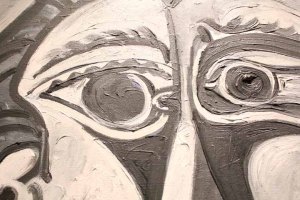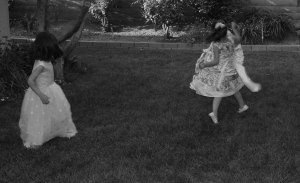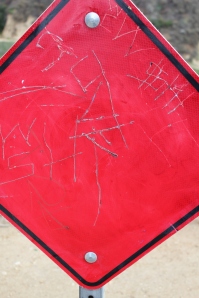My Aunt Irma is dead and gone now, and it’s too bad that my most prominent memory of her is unflattering. Whenever I think of her, it’s that ugly moment years ago when I was ten. She was drunk and insisted on dancing close and intimately with my Dad. My mother and us kids were there watching it all.
But there’s much more to the story. When I was five, our family moved into a new house in Whittier, California.
“You’ll never guess who’s living four blocks from us,” my mother said to my father one evening.
“Who?”
“Irma.”
“Oh God.”
Since they were family, my mother brought us over to their house one day. The families got to know each other. After all, Irma had a boy my age and a girl my sister’s age, and we were attending the same elementary school with each other. But deep down, the two mothers had a basic antipathy for each other.
 Maybe it was because they were so different. My mother was the kind of Mexican-American who saw her heritage as a ball and chain that she needed to cut off. She had been raised poor in East L.A., and she didn’t like the violence, misogyny, and machismo of the Mexican culture.
Maybe it was because they were so different. My mother was the kind of Mexican-American who saw her heritage as a ball and chain that she needed to cut off. She had been raised poor in East L.A., and she didn’t like the violence, misogyny, and machismo of the Mexican culture.
Once she came of age, my mother married the whitest man she could find. When he brought her home for the first time to meet his parents, his father ranted and raved and insisted that the marriage be annulled. His cowardly son meekly complied. Undeterred, she went out and found another whitest man she could find. That second one was my father.
Irma, on the other hand, gladly carried that ball and chain. She planted lots of fruit trees in her backyard, which was very East L.A. She went to mass every Sunday and didn’t serve meat on Friday, whereas my mother had become a Lutheran and took us to church with people who were the whitest of the white. Irma’s mother, who never learned English even after 50 years in the United States, lived with her, which was a Mexican tradition. There were little white lace doilies all around the house with framed photos of Mexican relatives.
Maybe it wasn’t that Irma and my mother were so different, but that they were too much the same. They were both terribly strong willed. There was something in Irma’s voice that was always harsh, never smooth or refined. She was always ready to make a bathroom joke. My mother could be harsh, too. Any decision she made was law, and anyone who questioned her authority was attacked mercilessly. In her later years, she adopted a motto she had heard in the movie, Dolores Claiborne, and relished saying wielding it.
“Sometimes, the only thing you have left is to be a bitch.”
That was inevitably followed by a sly, self-satisfied smile.
Our families tried to make the relationship work. I sometimes went over to their house and played with Irma’s son Joaquin. I played army with him, hiding behind brick fences and shooting at the other kids with my finger. I looked with pity at Joaquin’s sunken chest, and envied his great talent in art, and the fabulous pictures that he drew. Irma cherished her son, held him up high on a pedestal.
Then one evening, our family was invited to Irma’s house for dinner. I don’t remember much about the evening except the end of it. Irma was starting to get a little drunk, and as she turned the dance music up louder on the stereo, my mother objected.
“I’m sorry, Irma, but we’re going to have to leave,” my mother said. “We have to get up early tomorrow morning.”
“No, stay!” Irma said. “It’s Friday! The party’s just getting started!”
And with that, Irma grabbed my father’s hand and pulled him into the living room. My father tried to resist, but Irma was so insistent that it would have been impolite to pull away, so he humored her. Irma moved in close and tight, lambada-like, dancing in a way that shocked my mother. My sister and I watched in astonishment, as well. The song went on for the longest time, and then when it finally ended, my father pulled away.
“We have to go,” he said, and we were gone.
Our family talked about that evening for years afterwards. Irma drank too much. Irma was too East L.A. Irma was vulgar. In our family, Irma was a symbol of everything my mother had left behind.
 Years later, as college students, something unexpected happened. Joaquin and I became best friends. Unlike his mother, he turned out to be quite cultured and charming. I shared my writing with him, and he showed me his artwork. The first time I got drunk was with Joaquin in a little bar on Second Street in Belmont Shore, and we talked about T.S. Eliot and artists’ colonies, slamming our fists drunkenly on the little black table like we imagined they had in Paris in the 1920s. We felt that we were rising above our family feud, embracing forgiveness and graciousness.
Years later, as college students, something unexpected happened. Joaquin and I became best friends. Unlike his mother, he turned out to be quite cultured and charming. I shared my writing with him, and he showed me his artwork. The first time I got drunk was with Joaquin in a little bar on Second Street in Belmont Shore, and we talked about T.S. Eliot and artists’ colonies, slamming our fists drunkenly on the little black table like we imagined they had in Paris in the 1920s. We felt that we were rising above our family feud, embracing forgiveness and graciousness.
Strangely, though, history was about to torpedo our lofty goals. Two years later, I developed a serious crush on a young college classmate named Angelina, talked incessantly about her. I was angling how to turn a friendship into a romance. One night, I had a party. Joaquin and Angelina ended up making out in the backyard, and then went on to spend the next four years together. They became the consummate cozy couple. They traveled to Europe together and even caught a parasite together in Egypt.
I was monumentally angry and hurt. I didn’t talk to either of them during all that time. I was carrying around a scar the size of East L.A., which is nearly eight square miles. Everything I went through was seen through the lens of hurt and betrayal. Even the novel I was writing was, I now realize, all about betrayal, and we all know that novels are a snapshot of one’s soul.
Soon, however, I heard that their relationship had hit the skids. She had become disillusioned with him. She had started dating around. One evening out of the blue, Angelina showed up at my front door unannounced.
“Hi,” she said, leaning against the doorframe.
“Hello,” I said, confused.
“I was just driving around and I thought I’d stop by,” she said, a seductive lilt in her voice.
I slept with her that night and the circle began to close.
In the years since, the betrayals have been forgotten. It’s been years since I’ve seen things through the lens of revenge. As they say, it takes too much energy. Not only that, but if you get close enough to anyone, even the most faithful person in the world, they’re bound to betray you in some way or other. I recently published a novel, the lovely What Happens to Us, http://www.amazon.com/dp/B00DSSN5SU, and it was a relief to realize that it isn’t in any way, shape, or form about betrayal.
 It still amazes me how betrayal can move down through generations, reoccurring in different times and situations. I wonder sometimes if betrayal is genetic. Joaquin is still one of the most charming people I’ve ever met. He lives halfway across the world now, but every so often, we have long conversations. They are not vulgar. They are not fueled by liquor. They aren’t filled with bathroom humor. Irma is dead and gone now and time has healed many wounds. Sometimes, we feel like the best of friends again, wounds all healed, everything forgotten.
It still amazes me how betrayal can move down through generations, reoccurring in different times and situations. I wonder sometimes if betrayal is genetic. Joaquin is still one of the most charming people I’ve ever met. He lives halfway across the world now, but every so often, we have long conversations. They are not vulgar. They are not fueled by liquor. They aren’t filled with bathroom humor. Irma is dead and gone now and time has healed many wounds. Sometimes, we feel like the best of friends again, wounds all healed, everything forgotten.



You must be logged in to post a comment.